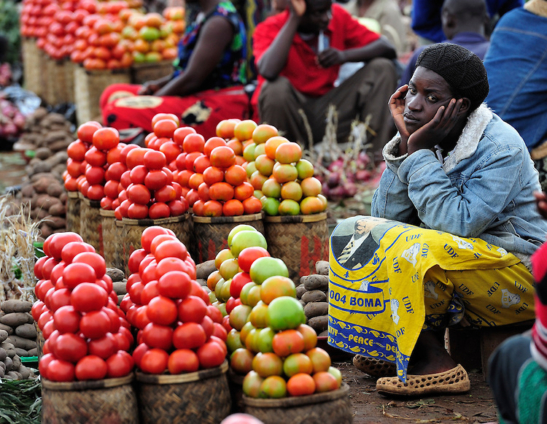Once upon a time in 2019, Ghana boasted of single-digit inflation. However, the country now grapples with double-digit inflation, a situation that ranks it among the worst globally. This inflationary pattern has taken on a cyclical nature – characterized by four months of steady decline followed by three months of persistent increase.
Following its peak in December 2022, accompanied by relative stability in January and February, experts anticipated a sustained decrease in price levels for the ensuing months. Contrarily, supply limitations and elevated production costs have compelled inflation to resume an upward trajectory.
July's elevated inflation, as reported by the Ghana Statistical Service, was significantly driven by the food and non-alcoholic beverages category, contributing over 54% of the overall increase.
Housing and utilities were the next prominent contributors, accounting for 11.3% of the inflationary pressure.
Tragically, Ghana has witnessed a more than six-fold surge in food inflation over the past decade. Despite securing fresh funding from the International Monetary Fund (IMF), the country continues to grapple with persistently high food inflation, maintaining its position as one of the highest within Africa and the West African sub-region. This unfortunate reality has led to reduced purchasing power for consumers and mounting production challenges for manufacturers.
The efficacy of the measures implemented, alongside the inherent difficulties Ghana faces, is called into question due to the lingering issue of soaring food prices.
In fact, the surge in food prices in Ghana is deeply entrenched in fundamental challenges within the agricultural sector. The sector encounters numerous structural obstacles that impede its productivity and expansion. Limited access to credit, inadequate infrastructure, outdated farming techniques, and inconsistent governmental policies collectively hinder the sector's ability to efficiently meet the rising demand for food.
Despite the rollout of flagship programs like "Planting for Food and Jobs" since 2017, the government's average annual expenditure of around $70 million on this initiative has not stemmed the worsening food inflation. Over the span of nearly six years, food inflation has escalated from 7.2% in April 2017 to a staggering 55%, an increase of nearly eightfold.
While the Ghanaian cedi has exhibited some stability against the US dollar, previous extended periods of depreciation have exacerbated inflation by driving up the cost of imports. Given Ghana's reliance on imported goods, including vital commodities like food, the country is particularly susceptible to fluctuations in its currency.
As a consequence, even a minor depreciation of the Ghanaian cedi substantially raises the prices of essential products, further burdening consumers. Experts contend that Ghana's ongoing economic challenges, notably the persistent depreciation of the currency and high inflation rates, could potentially be mitigated if citizens transition from consuming imported items to supporting locally-made products and services.
Ghana's Finance Minister, Ken Ofori-Atta, revealed in the 2023 budget statement that the nation's annual import expenditure exceeds US$10 billion, encompassing a wide range of items such as sugar, rice, fish, poultry, palm oil, cement, fertilizers, pharmaceuticals, toiletries, toothpicks, and fruit juices.
The scarcity of major staples in Ghana, due to factors like seasonal fluctuations, significantly contributes to the market's price surge. For instance, cassava, yam, plantains, and maize have all experienced upward price adjustments.
Moreover, Ghana faces a dual challenge with the ongoing conflict between Russia and Ukraine, as well as a military coup in Burkina Faso, placing immense strain on the nation. The military takeover in Niger has further complicated matters, resulting in rising prices of tomatoes, onions, and cereals due to border restrictions imposed by the Economic Community of West African States (ECOWAS).
The prolonged instability in Mali and Burkina Faso adds to these woes, potentially leading to artificial shortages and supply constraints that could derail the government's goal of achieving an inflation rate of 31.3%, revised from the initial target of 18.9%.
A high monetary policy rate of around 30%, coupled with a corresponding commercial borrowing cost nearing 40%, has created a crowded landscape for the private sector, as the government's 91-day treasury bill rate exceeds 24.4%.
Twitter: @isaackofiagyei (kindly follow for more)
Latest Stories
-
Reason for training professional counsellors is to heal a hurting world – CCP president
2 hours -
Woman allegedly brings dead man to bank to take out a loan
2 hours -
It’s a good feeling to score against PSG because I’m a Marseille boy – Andre Ayew
3 hours -
Joe Lartey Sr: A voice that brought life to Ghana sports and beyond
3 hours -
Bawumia promises to tackle issue most dear to Ghanaians as he begins nationwide campaign
4 hours -
Indian couple donate $24m fortune to charity to adopt monkhood
5 hours -
Australians call for tougher laws on violence against women after killings
5 hours -
African Development Council establishes mission in Benin for Francophone countries
6 hours -
Okyeame Kwame reveals his secret to longevity in music industry
6 hours -
Youthful-looking 60-year-old woman qualifies for Miss Argentina contest
6 hours -
Ejisu By-Election: Campaign heats up as NPP holds final rally ahead of Polls on Tuesday
6 hours -
Rwanda plan: Irish government wants to send asylum seekers back to UK
6 hours -
Ice cubes now cost more than bread and milk in parts of Mali
8 hours -
Titanic gold pocket watch sells for £900,000
9 hours -
Elon Musk in China to discuss enabling full self driving – reports
9 hours

